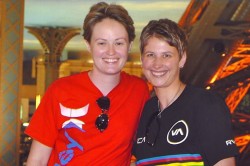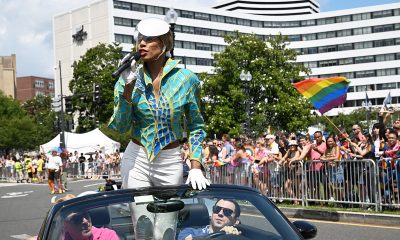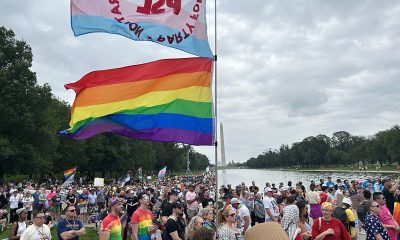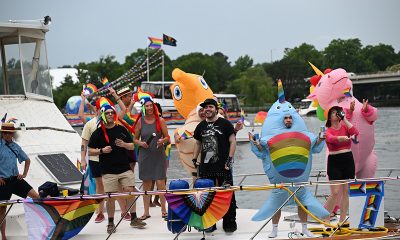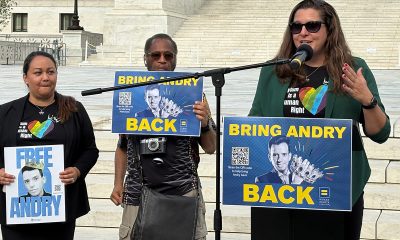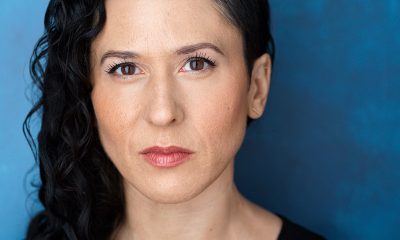National
Lesbian who fought workplace discrimination ‘honored’ to attend SOTU
Kilker to join handful of guests in first lady’s box

The invitation to witness the State of the Union address on Tuesday alongside first lady Michelle Obama came as a surprise to a lesbian analytical chemist who last year fought alleged workplace sex discrimination.
In an interview with the Washington Blade, Lorelei Kilker, 31, of Brighton, Colo., said she learned she was invited to attend the speech upon receiving a call from a White House official on Sunday.
“It was a Sunday and the middle of the day,” she said with a laugh. “They left a message on my phone from someone who said, ‘This is the White House.’ I was very shocked. I didn’t think that anything like this would happen. I was honored and shocked.”
One of a handful of guests that have been selected to sit in the first lady’s box in the House gallery, Kilker will watch President Obama deliver his speech at 9 p.m. before a joint session of Congress.
Kilker described the feeling of being able to sit next to first lady Michelle Obama to watch the president as he gives his speech as “overwhelming.”
“You see the president and you see the first lady on TV,” Kilker said. “You recognize them, but I never in a million years would have thought I would have the opportunity to see them in person. It’s pretty great.”
Kilker said she’ll be traveling to D.C. with her partner of three-and-a-half years, Sarah Nelson, who’s 33 and works at Dick’s Sporting Goods. They have two children, ages four and seven. However, Kilker will be attending the speech on her own.
The message that Kilker hopes to hear from President Obama on Tuesday night: “getting America back together, becoming united.”
Asked whether she’d like to hear something from Obama on LGBT issues, such as an endorsement of same-sex marriage, Kilker replied, “I think that that’s important. There have been steps, but we need something stronger.”
What would Kilker want to say to Michelle Obama if they have an opportunity to chat? Kilker said she’d commend the first lady for being an admirable person.
“The only thing I would say to her is that I think she’s a positive and strong female role model, and the Obama administration has done a lot for civil rights as opposed to other administrations,” Kilker said.
Kilker was invited to attend the State of the Union address after she received monetary relief in an Equal Employment Opportunity Commission case that investigated alleged sex discrimination she faced at while employed at the Western Sugar Cooperative.
According to an EEOC statement from when the case was resolved in October, EEOC found Western Sugar denied women training and promotions, gave them less desirable work assignments and segregated positions by gender at its Ft. Morgan, Colo., facility. Additionally, the company allegedly denied year-round employment and paid lower wages to women.
Western Sugar has denied any wrongdoing and maintains it’s an equal opportunity employer, but agreed to resolve the matter through EEOC’s reconciliation process.
But Kilker contends that women “had certain jobs they were allowed to have, and there were certain jobs that they were not allowed to have.”
“The jobs that women had were mediocre, they paid less,” Kilker said. “There was really no opportunity for advancement. The male jobs were higher-wage, promotions, things like that.”
When she tried to enter one of these “male jobs,” Kilker said she was repeatedly denied the opportunity despite her record.
“The management would come up to me and promise me that they were going to do this, they were going to do this,” Kilker said. “Then, they would go back and say, ‘No we’re not going to do this. No we’re not going to this. We changed our mind.”
Additionally, Kilker said management at the company singled her out for sexual harassment that made her “working life miserable” until she eventually quit her job.
“My family received phone calls saying that I was doing sexual activities in order to do jobs, and things like that,” Kilker said. “It got pretty disgusting.”
Kilker said the discrimination she faced was the result of her gender and not her sexual orientation. She said she doesn’t believe her former employer knew she was a lesbian.
On the grounds that the alleged discrimination was in violation of Title VII of the Civil Rights Act of 1964, Kilker filed charges on behalf of herself and other women at the company.
As a result of arrangements that were achieved through a cooperative process between the employer and EEOC, Kilker and others involved in the class-action case received $550,000 in relief. Further, Western Sugar agreed to remedial relief such as training for all employees and appointed an internal representative who’ll report to the EEOC to monitor the company’s employment practices for the next three years.
Kilker said she received “the majority share” of the $550,000, although she couldn’t recall the exact portion of that amount she received.
“I was so happy,” Kilker. “It had taken so many years that I just had kind of gotten to the point where I was over it. And then, the investigator at the EEOC really got into it, and it was just amazing how far they came with that.”
According to the White House, EEOC has obtained almost $50 million in monetary relief through administrative enforcement for victims of sex-based wage discrimination since the creation of the President’s Equal Pay Task Force in January 2010. Additionally, EEOC obtained changes to workplace practices that benefit more than 250,000 workers, and filed five cases including sex-based wage discrimination claims.
Although EEOC was able to resolve the issue, Kilker said more advancements are necessary to protect workers against discrimination.
Kilker said she supports the idea of Obama taking action administratively to bar discrimination in the workplace. Some LGBT rights advocates have urged the president to issue an executive order preventing federal dollars from going to companies without LGBT-inclusive workplace non-discrimination protections.
“I think that’s a great idea,” Kilker said. “It’s just another step in the right direction, and that’s what we need.”
But Kilker won’t be the only LGBT person attending the State of the Union. The other lesbian invitee is Air Force Col. Ginger Wallace, who’s 43 and lives in McLean, Va. She’s currently training to deploy to Afghanistan in the spring through the Afghanistan-Pakistan Hands program.
The Washington Blade reported in December on Wallace’s partner Kathy Knopf participating in her “pinning-on” promotion ceremony, the first reported instance of such an event happening with a same-sex partner since the lifting of “Don’t Ask, Don’t Tell.”
On Tuesday, Wallace told the Blade that she and her partner are “honored and humbled” to represent LGBT people and families who’ve served in the armed forces.
“We’re just amazed that we were chosen to do that,” Wallace said. “We’re just humbled to represent this unique section of people. There are really are a lot of exceptional gays and lesbians who serve in our military.”
If she has an opportunity to speak with Michelle Obama, Wallace said she’d thank the first lady — as well as second lady Jill Biden — for their work leading the national campaign called “Joining Forces,” which was launched in April to support military families through public service outreach and partnerships.
“They have worked tirelessly to increase support for military families, ensure that military families are taken care of,” Wallace said. “That’s important work, especially today. After 10 years of conflict, 10 years of deployment — that’s taken its toll.”
Wallace said she hopes Obama during his speech will the end of “Don’t Ask, Don’t Tell” as one of the accomplishments of his administration.
“I hope it is highlighted as a success, and I think, more importantly, I hope it is received by the audience as a success,” Wallace said. “I hope this is seen as the success I think the administration thinks it is.”
U.S. Federal Courts
Judge temporarily blocks executive orders targeting LGBTQ, HIV groups
Lambda Legal filed the lawsuit in federal court

A federal judge on Monday blocked the enforcement of three of President Donald Trump’s executive orders that would have threatened to defund nonprofit organizations providing health care and services for LGBTQ people and those living with HIV.
The preliminary injunction was awarded by Judge Jon Tigar of the U.S. District Court for the Northern District of California in a case, San Francisco AIDS Foundation v. Trump, filed by Lambda Legal and eight other organizations.
Implementation of the executive orders — two aimed at diversity, equity, and inclusion along with one targeting the transgender community — will be halted pending the outcome of the litigation challenging them.
“This is a critical win — not only for the nine organizations we represent, but for LGBTQ communities and people living with HIV across the country,” said Jose Abrigo, Lambda Legal’s HIV Project director and senior counsel on the case.
“The court blocked anti-equity and anti-LGBTQ executive orders that seek to erase transgender people from public life, dismantle DEI efforts, and silence nonprofits delivering life-saving services,” Abrigo said. “Today’s ruling acknowledges the immense harm these policies inflict on these organizations and the people they serve and stops Trump’s orders in their tracks.”
Tigar wrote, in his 52-page decision, “While the Executive requires some degree of freedom to implement its political agenda, it is still bound by the constitution.”
“And even in the context of federal subsidies, it cannot weaponize Congressionally appropriated funds to single out protected communities for disfavored treatment or suppress ideas that it does not like or has deemed dangerous,” he said.
Without the preliminary injunction, the judge wrote, “Plaintiffs face the imminent loss of federal funding critical to their ability to provide lifesaving healthcare and support services to marginalized LGBTQ populations,” a loss that “not only threatens the survival of critical programs but also forces plaintiffs to choose between their constitutional rights and their continued existence.”
The organizations in the lawsuit are located in California (San Francisco AIDS Foundation, Los Angeles LGBT Center, GLBT Historical Society, and San Francisco Community Health Center), Arizona (Prisma Community Care), New York (The NYC LGBT Community Center), Pennsylvania (Bradbury-Sullivan Community Center), Maryland (Baltimore Safe Haven), and Wisconsin (FORGE).
U.S. Supreme Court
Activists rally for Andry Hernández Romero in front of Supreme Court
Gay asylum seeker ‘forcibly deported’ to El Salvador, described as political prisoner
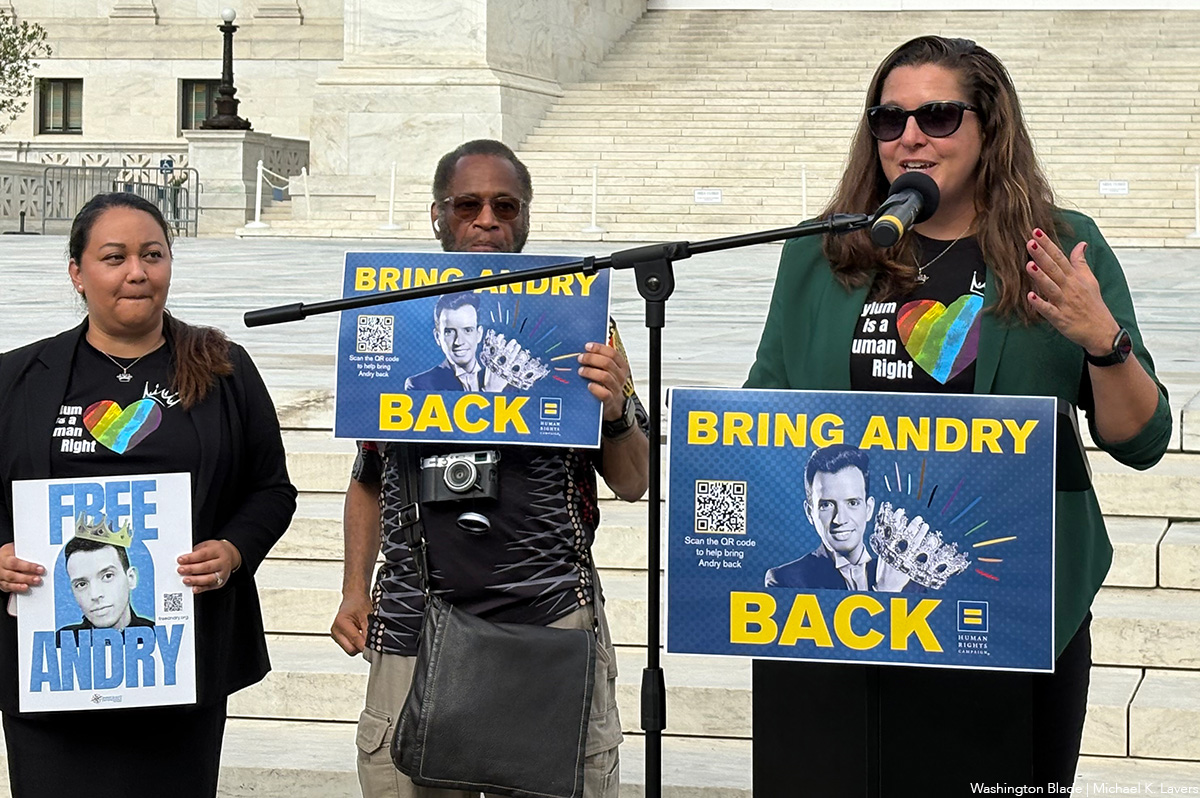
More than 200 people gathered in front of the U.S. Supreme Court on Friday and demanded the Trump-Vance administration return to the U.S. a gay Venezuelan asylum seeker who it “forcibly disappeared” to El Salvador.
Lindsay Toczylowski, president of the Immigrant Defenders Law Center, a Los Angeles-based organization that represents Andry Hernández Romero, is among those who spoke alongside U.S. Rep. Mark Takano (D-Calif.) and Human Rights Campaign Campaigns and Communications Vice President Jonathan Lovitz. Sarah Longwell of the Bulwark, Pod Save America’s Jon Lovett, and Tim Miller are among those who also participated in the rally.
“Andry is a son, a brother. He’s an actor, a makeup artist,” said Toczylowski. “He is a gay man who fled Venezuela because it was not safe for him to live there as his authentic self.”
(Video by Michael K. Lavers)
The White House on Feb. 20 designated Tren de Aragua, a Venezuelan gang, as an “international terrorist organization.”
President Donald Trump on March 15 invoked the Alien Enemies Act of 1798, which the Associated Press notes allows the U.S. to deport “noncitizens without any legal recourse.” The Trump-Vance administration subsequently “forcibly removed” Hernández and hundreds of other Venezuelans to El Salvador.
Toczylowski said she believes Hernández remains at El Salvador’s Terrorism Confinement Center, a maximum-security prison known by the Spanish acronym CECOT. Toczylowski also disputed claims that Hernández is a Tren de Aragua member.
“Andry fled persecution in Venezuela and came to the U.S. to seek protection. He has no criminal history. He is not a member of the Tren de Aragua gang. Yet because of his crown tattoos, we believe at this moment that he sits in a torture prison, a gulag, in El Salvador,” said Toczylowski. “I say we believe because we have not had any proof of life for him since the day he was put on a U.S. government-funded plane and forcibly disappeared to El Salvador.”
“Andry is not alone,” she added.
Takano noted the federal government sent his parents, grandparents, and other Japanese Americans to internment camps during World War II under the Alien Enemies Act. The gay California Democrat also described Hernández as “a political prisoner, denied basic rights under a law that should have stayed in the past.”
“He is not a case number,” said Takano. “He is a person.”
Hernández had been pursuing his asylum case while at the Otay Mesa Detention Center in San Diego.
A hearing had been scheduled to take place on May 30, but an immigration judge the day before dismissed his case. Immigrant Defenders Law Center has said it will appeal the decision to the Board of Immigration Appeals, which the Justice Department oversees.
“We will not stop fighting for Andry, and I know neither will you,” said Toczylowski.
Friday’s rally took place hours after Attorney General Pam Bondi said Kilmar Abrego Garcia, a Maryland man who the Trump-Vance administration wrongfully deported to El Salvador, had returned to the U.S. Abrego will face federal human trafficking charges in Tennessee.
National
A husband’s story: Michael Carroll reflects on life with Edmund White
Iconic author died this week; ‘no sunnier human in the world’
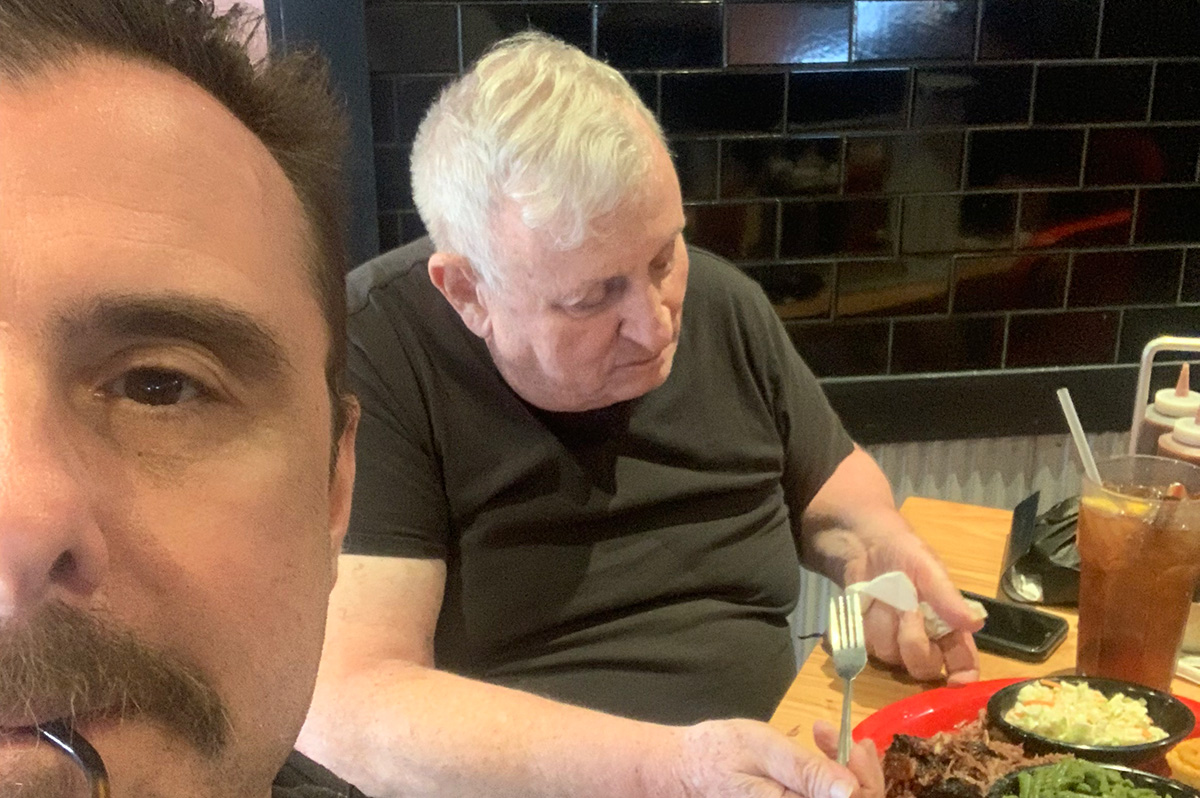
Unlike most gay men of my generation, I’ve only been to Fire Island twice. Even so, the memory of my first visit has never left me. The scenery was lovely, and the boys were sublime — but what stood out wasn’t the beach or the parties. It was a quiet afternoon spent sipping gin and tonics in a mid-century modern cottage tucked away from the sand and sun.
Despite Fire Island’s reputation for hedonism, our meeting was more accident than escapade. Michael Carroll — a Facebook friend I’d chatted with but never met — mentioned that he and his husband, Ed, would be there that weekend, too. We agreed to meet for a drink. On a whim, I checked his profile and froze. Ed was author Edmund White.
I packed a signed copy of Carroll’s “Little Reef” and a dog-eared hardback of “A Boy’s Own Story,” its spine nearly broken from rereads. I was excited to meet both men and talk about writing, even briefly.
Yesterday, I woke to the news that Ed had passed away. Ironically, my first thought was of Michael.
This week, tributes to Edmund White are everywhere — rightly celebrating his towering legacy as a novelist, essayist, and cultural icon. I’ve read all of his books, and I could never do justice to the scope of a career that defined and chronicled queer life for more than half a century. I’ll leave that to better-prepared journalists.
But in those many memorials, I’ve noticed something missing. When Michael Carroll is mentioned, it’s usually just a passing reference: “White’s partner of thirty years, twenty-five years his junior.” And yet, in the brief time I spent with this couple on Fire Island, it was clear to me that Michael was more than a footnote — he was Ed’s anchor, editor, companion, and champion. He was the one who knew his husband best.
They met in 1995 after Michael wrote Ed a fan letter to tell him he was coming to Paris. “He’d lost the great love of his life a year before,” Michael told me. “In one way, I filled a space. Understand, I worshiped this man and still do.”
When I asked whether there was a version of Ed only he knew, Michael answered without hesitation: “No sunnier human in the world, obvious to us and to people who’ve only just or never met him. No dark side. Psychology had helped erase that, I think, or buffed it smooth.”
Despite the age difference and divergent career arcs, their relationship was intellectually and emotionally symbiotic. “He made me want to be elegant and brainy; I didn’t quite reach that, so it led me to a slightly pastel minimalism,” Michael said. “He made me question my received ideas. He set me free to have sex with whoever I wanted. He vouchsafed my moods when they didn’t wobble off axis. Ultimately, I encouraged him to write more minimalistically, keep up the emotional complexity, and sleep with anyone he wanted to — partly because I wanted to do that too.”
Fully open, it was a committed relationship that defied conventional categories. Ed once described it as “probably like an 18th-century marriage in France.” Michael elaborated: “It means marriage with strong emotion — or at least a tolerance for one another — but no sex; sex with others. I think.”
That freedom, though, was always anchored in deep devotion and care — and a mutual understanding that went far beyond art, philosophy, or sex. “He believed in freedom and desire,” Michael said, “and the two’s relationship.”
When I asked what all the essays and articles hadn’t yet captured, Michael paused. “Maybe that his writing was tightly knotted, but that his true personality was vulnerable, and that he had the defense mechanisms of cheer and optimism to conceal that vulnerability. But it was in his eyes.”
The moment that captured who Ed was to him came at the end. “When he was dying, his second-to-last sentence (garbled then repeated) was, ‘Don’t forget to pay Merci,’ the cleaning lady coming the next day. We had had a rough day, and I was popping off like a coach or dad about getting angry at his weakness and pushing through it. He took it almost like a pack mule.”
Edmund White’s work shaped generations — it gave us language for desire, shame, wit, and liberation. But what lingers just as powerfully is the extraordinary life Ed lived with a man who saw him not only as a literary giant but as a real person: sunny, complex, vulnerable, generous.
In the end, Ed’s final words to his husband weren’t about his books or his legacy. They were about care, decency, and love. “You’re good,” he told Michael—a benediction, a farewell, maybe even a thank-you.
And now, as the world celebrates the prolific writer and cultural icon Edmund White, it feels just as important to remember the man and the person who knew him best. Not just the story but the characters who stayed to see it through to the end.

